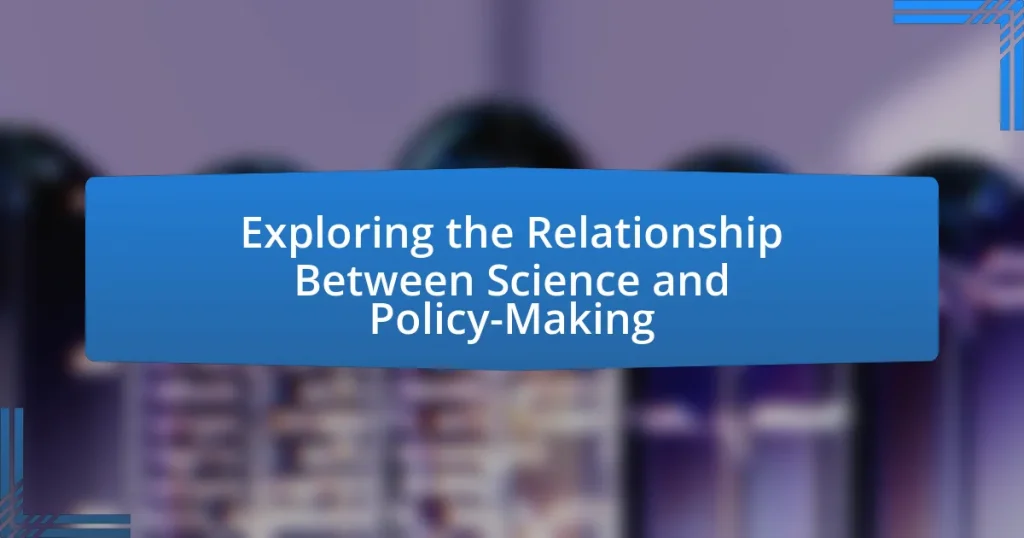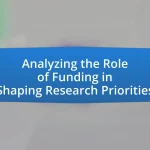The article explores the integral relationship between science and policy-making, emphasizing how scientific research provides evidence-based insights that inform policy decisions across various sectors, including climate change and public health. It outlines the mechanisms through which scientific findings influence policy, such as evidence-based research and expert consultations, while also addressing the challenges of aligning scientific data with political agendas. The discussion highlights the importance of integrating scientific evidence into policy-making to enhance governance and the potential consequences of neglecting scientific insights. Additionally, it examines the evolving nature of the science-policy interface, the role of scientific institutions, and best practices for improving collaboration and communication between scientists and policymakers.
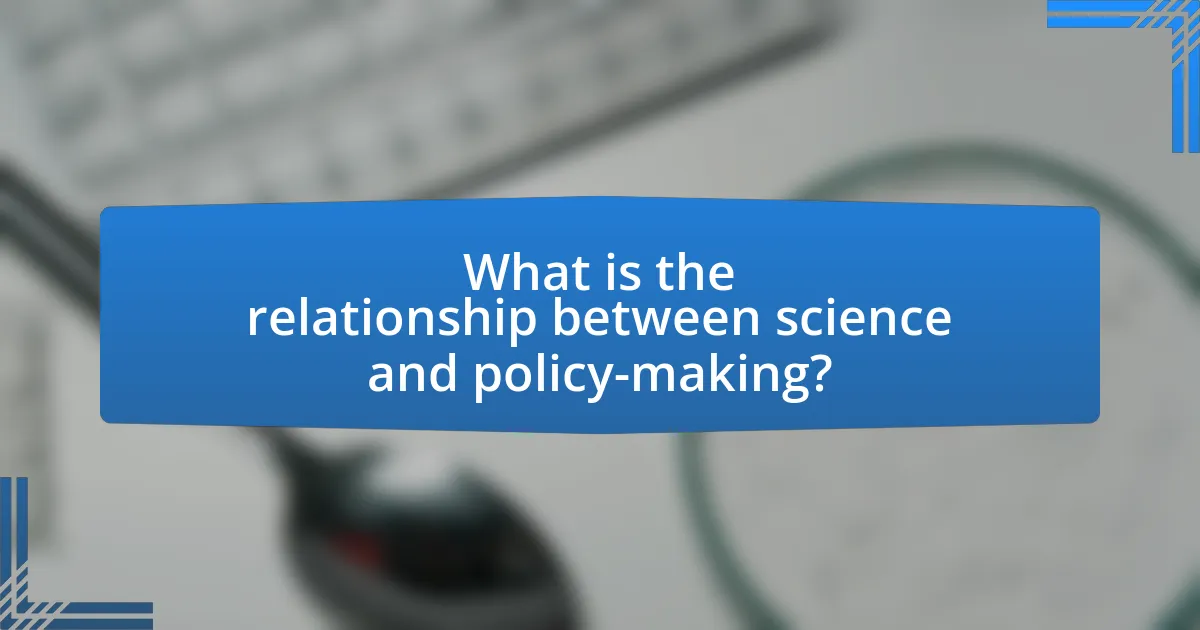
What is the relationship between science and policy-making?
The relationship between science and policy-making is integral, as scientific research provides evidence-based insights that inform policy decisions. Policymakers rely on scientific data to understand complex issues, such as climate change, public health, and technology regulation, ensuring that policies are effective and grounded in reality. For instance, the Intergovernmental Panel on Climate Change (IPCC) reports synthesize scientific findings to guide international climate agreements, demonstrating how scientific consensus shapes global policy frameworks. This interplay ensures that policies are not only responsive to societal needs but also sustainable and informed by the latest scientific advancements.
How do scientific findings influence policy decisions?
Scientific findings influence policy decisions by providing evidence-based data that informs lawmakers and stakeholders about the implications of various issues. For instance, research on climate change, such as the Intergovernmental Panel on Climate Change (IPCC) reports, has led to international agreements like the Paris Agreement, which aims to limit global warming. These findings help policymakers understand the urgency and scale of environmental challenges, guiding regulations and funding priorities. Additionally, health studies, such as those from the Centers for Disease Control and Prevention (CDC), shape public health policies by highlighting the effectiveness of vaccination programs, thereby influencing legislation on healthcare funding and public health initiatives.
What are the mechanisms through which science informs policy?
Science informs policy through mechanisms such as evidence-based research, expert consultations, and the dissemination of scientific knowledge. Evidence-based research provides policymakers with data and findings that guide decision-making, ensuring that policies are grounded in empirical evidence. Expert consultations involve engaging scientists and researchers to offer insights and recommendations on specific issues, thereby integrating scientific expertise into the policy development process. Additionally, the dissemination of scientific knowledge through reports, publications, and public forums helps to raise awareness and understanding of scientific findings among policymakers, facilitating informed discussions and decisions. These mechanisms collectively enhance the relevance and effectiveness of policies by aligning them with scientific understanding and advancements.
How do policymakers interpret scientific data?
Policymakers interpret scientific data by analyzing empirical evidence to inform decision-making processes. They assess the credibility, relevance, and applicability of scientific findings to address specific policy issues. For instance, the Intergovernmental Panel on Climate Change (IPCC) reports provide comprehensive assessments of climate science that policymakers use to shape environmental regulations. This reliance on peer-reviewed studies and expert consensus ensures that policies are grounded in reliable scientific knowledge, facilitating informed governance.
Why is the integration of science in policy-making important?
The integration of science in policy-making is important because it ensures that decisions are based on empirical evidence and sound research. This reliance on scientific data leads to more effective and efficient policies that address societal challenges, such as climate change and public health. For instance, the Intergovernmental Panel on Climate Change (IPCC) provides comprehensive assessments that inform global climate policies, demonstrating how scientific findings can guide legislative action. By incorporating scientific insights, policymakers can better anticipate outcomes, allocate resources wisely, and enhance public trust in governance.
What are the potential consequences of ignoring scientific evidence in policy?
Ignoring scientific evidence in policy can lead to detrimental outcomes such as ineffective regulations, public health crises, and environmental degradation. For instance, the refusal to acknowledge climate change science has resulted in policies that fail to mitigate greenhouse gas emissions, contributing to extreme weather events and biodiversity loss. Additionally, the dismissal of scientific findings in public health, as seen during the COVID-19 pandemic, can exacerbate the spread of disease and increase mortality rates. Historical examples, such as the tobacco industry’s influence on smoking regulations, demonstrate how neglecting scientific evidence can prolong public health risks. These consequences underscore the critical need for evidence-based decision-making in policy formulation.
How does science contribute to effective governance?
Science contributes to effective governance by providing evidence-based data that informs policy decisions. This empirical approach enables policymakers to understand complex issues, such as public health, environmental sustainability, and economic development, leading to more informed and effective regulations. For instance, the use of scientific research in the formulation of the Clean Air Act in the United States has demonstrated how data on air quality can lead to significant improvements in public health outcomes. Additionally, the integration of scientific expertise in governance processes, such as through advisory committees or research institutions, ensures that policies are grounded in the latest findings and technological advancements, enhancing their relevance and effectiveness.
What challenges exist in aligning science with policy-making?
Aligning science with policy-making faces several challenges, including communication gaps, differing priorities, and the complexity of scientific data. Communication gaps arise when scientists and policymakers use different terminologies and frameworks, leading to misunderstandings. Differing priorities occur as policymakers often prioritize immediate economic or political concerns over long-term scientific evidence. Additionally, the complexity of scientific data can make it difficult for policymakers to interpret findings accurately, which can hinder informed decision-making. These challenges are documented in studies such as “The Role of Science in Policy-Making” by the National Academy of Sciences, which highlights the need for effective science communication and collaboration between scientists and policymakers to bridge these gaps.
What are the barriers to effective communication between scientists and policymakers?
Barriers to effective communication between scientists and policymakers include differences in language, priorities, and timelines. Scientists often use technical jargon and complex data that may not be easily understood by policymakers, who require clear and actionable information. Additionally, scientists typically focus on long-term research goals, while policymakers prioritize immediate societal needs and political considerations. This misalignment can lead to misunderstandings and a lack of trust. Research by the National Academies of Sciences indicates that these barriers can hinder the integration of scientific evidence into policy decisions, ultimately affecting public outcomes.
How do political agendas affect the use of scientific evidence?
Political agendas significantly influence the use of scientific evidence by prioritizing certain findings that align with specific political goals while disregarding or downplaying others. For instance, during the COVID-19 pandemic, various governments selectively highlighted scientific studies that supported their policies on lockdowns or vaccine distribution, often ignoring contradictory evidence that could undermine their positions. This selective use of scientific evidence can lead to public misinformation and hinder effective policy-making, as seen in the debates surrounding climate change, where political leaders may reject established scientific consensus to align with their economic or ideological interests.
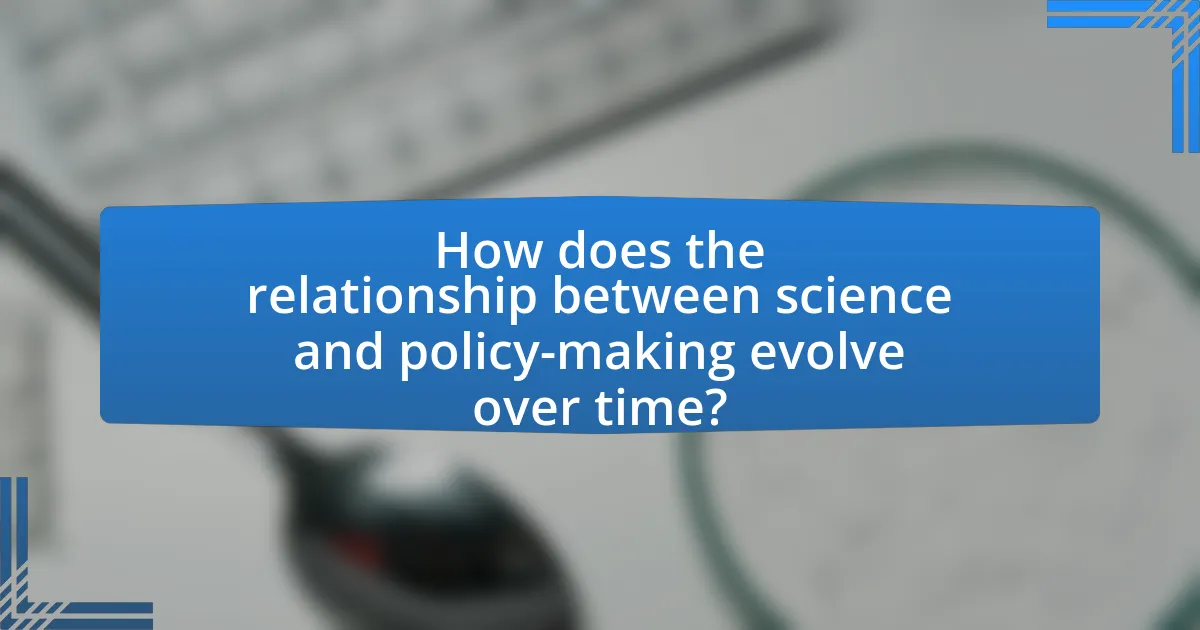
How does the relationship between science and policy-making evolve over time?
The relationship between science and policy-making evolves through a dynamic interplay influenced by societal needs, technological advancements, and political contexts. Initially, scientific discoveries often inform policy decisions, as seen during the Industrial Revolution when advancements in engineering and chemistry led to regulatory frameworks for public safety and environmental protection. Over time, this relationship has become more reciprocal; for instance, the establishment of evidence-based policy-making in the late 20th century emphasized the need for policies to be grounded in scientific research, as demonstrated by the creation of institutions like the National Academy of Sciences in the United States, which advises on scientific matters relevant to policy. Furthermore, contemporary challenges such as climate change illustrate how policy-making increasingly relies on scientific consensus to guide international agreements, like the Paris Agreement, reflecting an ongoing evolution towards integrating scientific expertise into policy frameworks.
What historical events have shaped the science-policy interface?
The science-policy interface has been significantly shaped by historical events such as the establishment of the National Science Foundation in 1950, which formalized the relationship between scientific research and government policy in the United States. This event marked a pivotal moment in recognizing the importance of scientific input in policy-making processes. Additionally, the 1972 United Nations Conference on the Human Environment in Stockholm highlighted the need for integrating scientific knowledge into environmental policy, leading to the creation of various international environmental agreements. Furthermore, the 2001 Intergovernmental Panel on Climate Change (IPCC) assessment reports underscored the critical role of scientific evidence in shaping global climate policies, influencing international negotiations like the Paris Agreement in 2015. These events collectively illustrate how the science-policy interface has evolved through institutional recognition, international collaboration, and the necessity of evidence-based decision-making.
How have past crises influenced the integration of science in policy?
Past crises have significantly accelerated the integration of science into policy by highlighting the need for evidence-based decision-making. For instance, the COVID-19 pandemic underscored the importance of scientific research in shaping public health responses, leading to the establishment of advisory bodies like the Scientific Advisory Group for Emergencies in the UK, which directly informed government actions. Historical events, such as the 2008 financial crisis, also prompted policymakers to rely on economic models and scientific analyses to guide recovery efforts, demonstrating that crises often catalyze a shift towards incorporating scientific expertise in policy formulation.
What role do scientific institutions play in policy development?
Scientific institutions play a crucial role in policy development by providing evidence-based research and expertise that inform decision-making processes. These institutions conduct rigorous studies, generate data, and offer insights that help policymakers understand complex issues, such as climate change, public health, and technology regulation. For example, the Intergovernmental Panel on Climate Change (IPCC) synthesizes scientific findings to guide international climate policy, demonstrating how scientific institutions can directly influence global agreements and national strategies. Their contributions ensure that policies are grounded in scientific knowledge, enhancing their effectiveness and credibility.
How do emerging scientific fields impact policy-making?
Emerging scientific fields significantly influence policy-making by providing new data, insights, and technologies that inform decisions. For instance, advancements in climate science have led to the development of policies aimed at reducing carbon emissions, as evidenced by the Paris Agreement, which was informed by extensive research on climate change impacts. Additionally, fields like biotechnology and artificial intelligence are shaping regulations around ethical standards and safety protocols, as seen in the European Union’s General Data Protection Regulation, which addresses data privacy concerns stemming from AI advancements. These examples illustrate how emerging scientific fields not only contribute to the knowledge base but also drive legislative frameworks and regulatory measures.
What are the implications of new technologies on existing policies?
New technologies significantly impact existing policies by necessitating updates to regulatory frameworks to address emerging challenges and opportunities. For instance, the rise of artificial intelligence has prompted governments to reconsider data privacy laws, as traditional regulations may not adequately protect individuals in a digital landscape. The European Union’s General Data Protection Regulation (GDPR) exemplifies this shift, as it was enacted to safeguard personal data in response to advancements in technology. Additionally, new technologies can create gaps in existing policies, leading to potential risks such as cybersecurity threats, which require immediate legislative attention to mitigate harm. Therefore, the implications of new technologies on existing policies include the need for continuous policy evolution to ensure they remain relevant and effective in a rapidly changing technological environment.
How can policymakers stay informed about rapid scientific advancements?
Policymakers can stay informed about rapid scientific advancements by actively engaging with scientific communities, utilizing expert advisory panels, and subscribing to reputable scientific journals. Engaging with scientific communities allows policymakers to access the latest research and innovations directly from researchers. Expert advisory panels, such as the National Academy of Sciences, provide tailored insights and recommendations based on current scientific knowledge. Subscribing to reputable scientific journals, like Nature or Science, ensures that policymakers receive peer-reviewed studies and findings that are critical for informed decision-making. These methods collectively enhance policymakers’ understanding of scientific developments, enabling them to craft evidence-based policies.
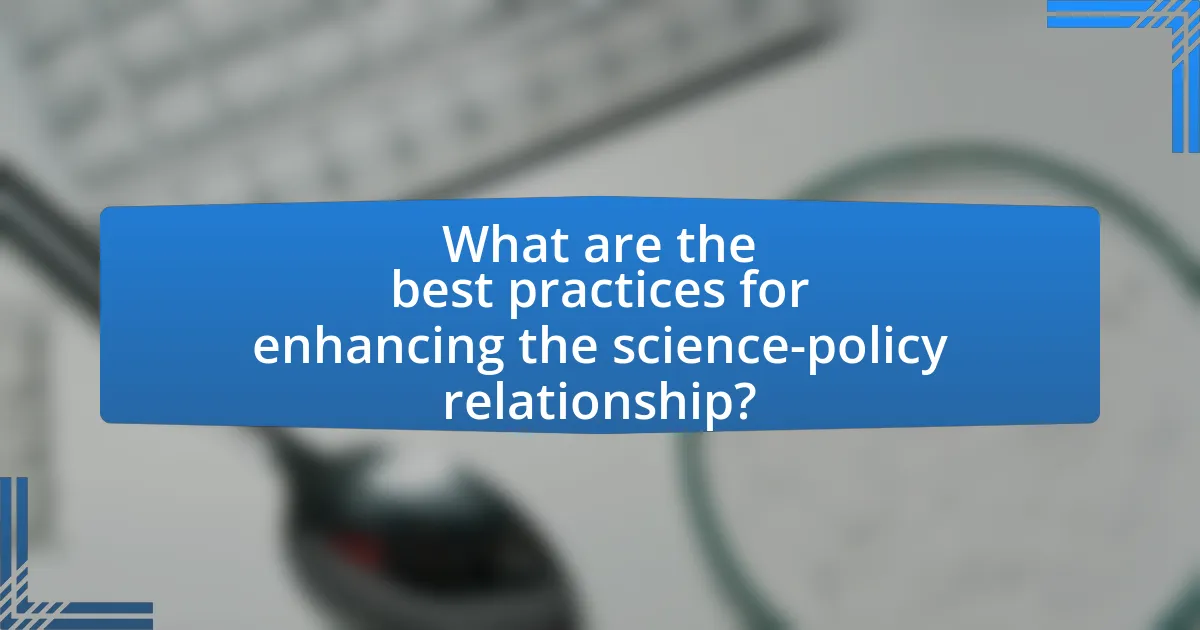
What are the best practices for enhancing the science-policy relationship?
The best practices for enhancing the science-policy relationship include fostering collaboration between scientists and policymakers, ensuring effective communication of scientific findings, and integrating scientific evidence into policy development. Collaboration can be achieved through joint initiatives, workshops, and advisory committees that bring together experts from both fields, as seen in successful models like the Intergovernmental Panel on Climate Change (IPCC). Effective communication involves translating complex scientific data into accessible formats for policymakers, which has been shown to improve decision-making processes. Furthermore, integrating scientific evidence into policy development ensures that policies are informed by the latest research, as demonstrated by the use of evidence-based practices in public health policy, leading to improved health outcomes.
How can scientists effectively communicate their findings to policymakers?
Scientists can effectively communicate their findings to policymakers by using clear, concise language and focusing on actionable insights. This approach ensures that complex scientific data is translated into understandable terms that highlight the implications for policy decisions. For instance, the National Academy of Sciences emphasizes the importance of tailoring messages to the audience, which includes using visuals and summaries to convey key points quickly. Additionally, establishing ongoing relationships with policymakers fosters trust and facilitates dialogue, allowing scientists to better understand the needs and priorities of decision-makers.
What strategies can be employed to bridge the gap between science and policy?
To bridge the gap between science and policy, strategies such as enhancing communication, fostering collaboration, and integrating scientific evidence into policy-making processes can be employed. Effective communication involves translating complex scientific findings into accessible language for policymakers, ensuring that research is relevant to policy needs. Fostering collaboration between scientists and policymakers through joint initiatives and workshops can build mutual understanding and trust. Additionally, integrating scientific evidence into policy-making processes, as seen in frameworks like the Evidence-Based Policy initiative, ensures that decisions are informed by the best available research, leading to more effective and sustainable policies.
How can collaborative efforts improve science-based policy-making?
Collaborative efforts can improve science-based policy-making by integrating diverse expertise and perspectives, leading to more informed and effective decisions. When scientists, policymakers, and stakeholders work together, they can identify relevant data, address complex issues, and ensure that policies are grounded in the latest scientific findings. For example, the National Academy of Sciences emphasizes that collaboration fosters trust and communication, which are essential for translating scientific knowledge into actionable policies. This approach not only enhances the quality of policy outcomes but also increases public engagement and support for science-based initiatives.
What role do public engagement and education play in this relationship?
Public engagement and education are crucial in bridging the gap between science and policy-making. They facilitate informed decision-making by ensuring that policymakers understand scientific findings and the public is aware of the implications of these policies. For instance, initiatives like the National Science Foundation’s “Science and Technology Policy Fellowships” demonstrate how educating policymakers about scientific research can lead to more effective and evidence-based policies. Furthermore, public engagement fosters transparency and trust, which are essential for the successful implementation of science-informed policies.
How can citizen science contribute to policy development?
Citizen science can significantly contribute to policy development by providing valuable data and insights that inform decision-making processes. Engaging the public in scientific research allows for the collection of large-scale data that may not be feasible for traditional research methods. For instance, initiatives like the Audubon Society’s Christmas Bird Count have generated extensive data on bird populations, influencing conservation policies. Furthermore, citizen science fosters community involvement, ensuring that policies reflect the needs and concerns of the public. Studies have shown that incorporating citizen-generated data can enhance the credibility and acceptance of policies, as seen in environmental management cases where local knowledge was integrated into policy frameworks.
What are the benefits of involving the public in scientific discourse related to policy?
Involving the public in scientific discourse related to policy enhances decision-making by incorporating diverse perspectives and fostering trust. This engagement leads to more informed policies that reflect the values and needs of the community, ultimately resulting in greater public support and compliance. Research indicates that public participation can improve the quality of scientific research by ensuring that it addresses real-world issues, as seen in the case of the U.S. Environmental Protection Agency’s efforts to involve communities in environmental decision-making processes. Furthermore, studies show that when the public is engaged, there is a higher likelihood of successful implementation of policies, as stakeholders feel a sense of ownership and responsibility towards the outcomes.
What practical steps can policymakers take to incorporate scientific evidence?
Policymakers can incorporate scientific evidence by establishing formal mechanisms for evidence synthesis, such as advisory committees that include scientists and stakeholders. These committees can evaluate and summarize relevant research findings, ensuring that policies are informed by the latest scientific knowledge. Additionally, policymakers should invest in training programs that enhance the scientific literacy of decision-makers, enabling them to critically assess research and its implications for policy. For instance, the National Academy of Sciences has emphasized the importance of integrating scientific expertise into policy discussions to improve decision-making processes. Furthermore, creating partnerships between research institutions and government agencies can facilitate the continuous flow of information and foster a culture of evidence-based policymaking.
